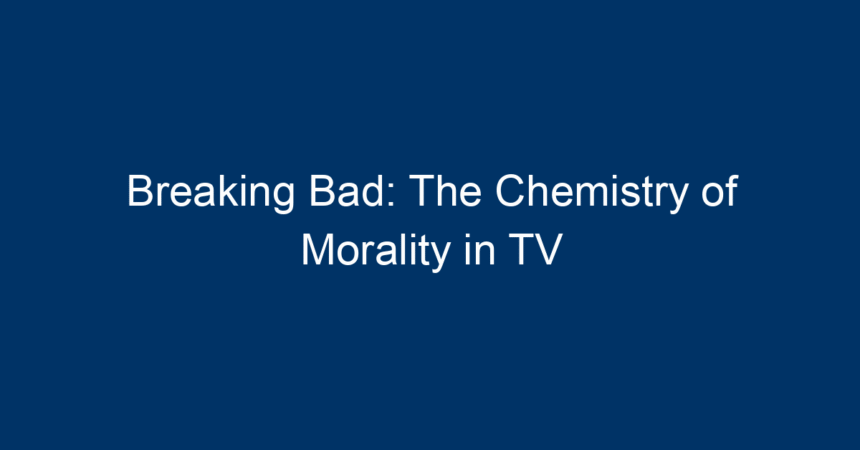Introduction: The Alchemy of Transformation
"Breaking Bad," created by Vince Gilligan, is more than just a gripping story about a high school chemistry teacher turned methamphetamine manufacturer; it is a profound exploration of morality and the human psyche. The series, which premiered in 2008, captivated audiences with its intricate character development, tense storytelling, and moral complexities. As Walter White, portrayed masterfully by Bryan Cranston, transforms from a mild-mannered educator to a ruthless drug kingpin, viewers are invited to examine the fluid nature of morality within the pressures of desperation and ambition. This article dissects the intricate chemistry of morality in "Breaking Bad," illustrating how the series serves as an allegory for ethical decisions in our own lives.
The Catalyst: Walter White’s Transformation
Walter White’s journey is the heart of "Breaking Bad." Diagnosed with terminal lung cancer, Walter’s initial motivations seem relatable; he desires to secure his family’s financial future. Yet, as he dives deeper into the world of drug manufacturing, the story transitions from a tale of desperation to one of profound moral corruption.
Character Development and Morality
Walter White’s evolution raises crucial questions: What would you do in his situation? Would you prioritize survival over ethics? Initially, many viewers sympathize with Walter’s plight. However, as his actions grow increasingly reprehensible, the moral lines blur. Gilligan’s skillful character development forces us to confront the dichotomy of good and evil. Walter White, once a sympathetic character, becomes the embodiment of moral decay, leading to a deeper examination of societal norms and personal justification.
The Chemistry of Relationships
One of the underlying themes of "Breaking Bad" is the chemistry among its characters. Just as in science, where compounds interact and produce unforeseen reactions, the relationships in the show are fraught with tension and complexity.
Walter and Jesse: The Moral Compass
The relationship between Walter White and Jesse Pinkman (Aaron Paul) embodies a profound moral landscape. Initially, Jesse serves as Walter’s subordinate, representing youthful recklessness and impulsiveness. However, as the series progresses, their dynamics shift drastically.
Jesse’s guilt over their actions contrasts sharply with Walter’s increasingly narcissistic tendencies. Jesse’s moral compass serves as a counterbalance to Walter’s descent, showcasing how influences can warp ethical standing. Viewers are drawn into the emotional turmoil of both characters, making their collective journey strikingly relatable.
The Role of Antagonists: Heisenberg’s Influence
In "Breaking Bad," morality is not drawn in black and white; it exists in shades of gray. The presence of adversaries, such as Gus Fring (Giancarlo Esposito) and Hank Schrader (Dean Norris), adds layers to the moral dilemmas.
Gus Fring: The Machiavellian Drug Lord
Gus Fring exemplifies a different approach to morality—calculated, ruthless, and pragmatic. His character challenges Walter by presenting a more refined vision of the drug trade. While Gus operates under a guise of respectability, his actions reveal the darkest corners of human ambition. Through Gus, "Breaking Bad" explores the ethics of power and the lengths individuals will go to maintain control.
The Ethics of Decision-Making
As Walter White transcends into the infamous drug lord Heisenberg, the show’s narrative delves into the complexities of decision-making. Walter’s choices become progressively self-serving, showcasing the moral decline stemming from unchecked ambition.
The Consequences of Choices
"Breaking Bad" serves as a powerful reminder of the consequences of one’s choices. Whether it’s the impact on family, friends, or innocents affected by the drug trade, every action has repercussions. Gilligan meticulously crafts a narrative where every decision spirals into a chain of events, revealing the weight of morality within decision-making.
Moral Ambiguity: A Reflection of Society
The series’ exploration of morality is not confined to its fictional realm; it mirrors the ethical complexities present in society. As viewers, we engage in a constant reflection on our values and ethics, asking ourselves difficult questions.
Societal Pressures and Morality
"Breaking Bad" shines a light on societal pressures that can force individuals into moral quandaries. Whether it’s economic struggles, familial loyalty, or the thirst for power, these pressures can lead anyone down a dark path. The narrative emphasizes that it’s not mere villainy driving Walter’s transformation—it’s a confluence of desperate circumstances and personal choices.
The Boundaries of Moral Philosophy: Right vs. Wrong
The series invites viewers into a philosophical discourse on morality. Are the dualities of right and wrong absolute, or are they influenced by context and ambition? Walter White’s actions, though illegal, often stem from a place of perceived necessity.
Philosophical Underpinnings in "Breaking Bad"
The ethical theories of utilitarianism and deontology manifest prominently in the series. Walter’s justification for his actions echoes utilitarian principles—serving the greater good of his family, albeit through destructive means. On the other hand, the show also underscores deontological ethics, questioning the intrinsic morality of the actions rather than the consequences.
Conclusion: Lessons Learned from Breaking Bad
"Breaking Bad" stands as a monumental achievement in television, not just for its storytelling but for its deep exploration of morality. The series challenges viewers to reassess their own ethical frameworks, urging self-reflection on ambiguous moral landscapes.
Actionable Insights
- Reflect on Choices: Like Walter, consider the broader implications of your decisions. Every choice has consequences, often unforeseen.
- Understand Context: Before judging others’ decisions, explore the pressures and circumstances they face. Moral dilemmas are rarely black and white.
- Engage in Dialogue: Discuss the moral implications presented in media like "Breaking Bad" to gain insights into your ethical beliefs and those of others.
Ultimately, the chemistry of morality in "Breaking Bad" serves as a lens through which we can examine our own lives. The moral landscape is complex, filled with challenges that can lead to both devastating consequences and profound insights. In navigating this landscape, we find the opportunity for growth, understanding, and an ongoing dialogue about right and wrong in our society.




